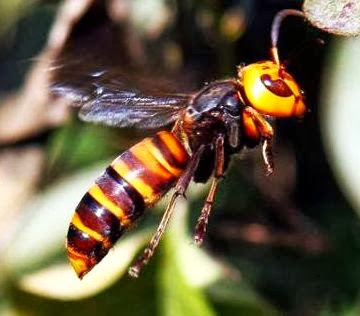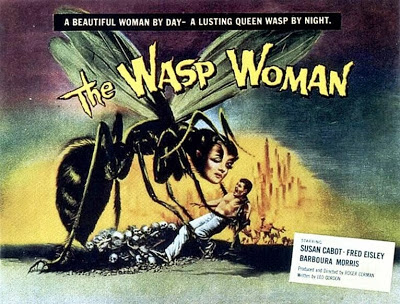Philosophy

Killer hornets: A series of deadly attacks by the Asian giant hornet in China has prompted officials to warn citizens away from forests and fields.
by
Marc Lallanilla
September 27th, 2013
The Christian Science Monitor
A series of deadly hornet attacks has led Chinese officials to warn citizens to avoid walking through fields and wooded areas this year. At least 28 people have been killed, and hundreds seriously injured, when swarms of the stinging insects descend without warning on unsuspecting people.
The prime suspect in the killings is the Asian giant hornet — sometimes called the yak-killer hornet (Vespa mandarinia) — which can grow to be more than 2 inches (5 centimeters) in length, and has a quarter-inch-long (6 millimeters) stinger that delivers venom containing a potent neurotoxin.
The Asian giant hornet is the world's largest hornet, and is a voracious predator that dines on mantises, bees and other large insects. It has a deservedly evil reputation for wiping out entire hives containing thousands of honeybees by biting off the bees' heads and then stealing their honey and bee larvae. The hornets are capable of flying up to 62 miles (100 kilometers) in a single day at speeds of 25 mph (40 km/h).
Most of the attacks have occurred in Shaanxi province, the South China Morning Post reports. One victim suffered acute renal failure after being stung by hornets; the man claimed the hornets chased him over a distance of more than 650 feet (200 meters). A 55-year-old woman from the same village reported that she was stung more than 200 times and needed to be hospitalized for almost a month.
The unexpected rise in hornet attacks may be due to a number of factors, according to The Guardian. Hotter weather in the area has led to more successful breeding for the hornets, and laborers are moving deeper into the isolated rural areas where the hornets typically live.
"Patients with more than 10 hornet stings should seek medical attention. Those with more than 30 stings need immediate emergency treatment," said a director of the Ankang (Shaanxi) Disease Control Center, as quoted in the Post. Area hospitals have now created medical teams specializing in the treatment of hornet stings, and fire crews have removed more than 300 hornet nests from residential areas in an effort to prevent additional deaths and injuries.
Asian giant hornet [Wikipedia]
Well, I guess it has been done.

- Hungry And Dangerous Animals
The natural world is full of amazing and inspiring scenes, but it's also the source of almost unimaginable cruelty and violent predation, as the following amazing pics from this past year demonstrate (of course, they're no match for the destruction...
- At&t Coughed Up A Recording Of A Very Long Distance Phone Call...to The Moon
"Tech Time Warp of the Week: Watch President Nixon Dial the Moon in 1969" by Daniela Hernandez February 21st, 2014 Wired President Nixon placed countless phone calls from the Oval Office, but there was one he called the most historic call ever made...
- Bees..."mary Celeste Syndrome"
This is scarier than Iran with nuclear weapons or Al-Qaeda and far more reaching. "Fears for crops as shock figures from America show scale of bee catastrophe" The world may be on the brink of biological disaster after news that a third of US bee colonies...
- Human Profiling
Can a case be made for profiling...now to include "gender"? "After Attacks in Russia, Fears of Xenophobia" by Michael Schwirtz April 5th, 2010 The New York Times Lilya Paizulayeva descended into the subway anxiously, trying to keep her distance from...
- Alarming And Sad
Yesterday I noted the passing of Andrew Lange of the California Institute of Technology. When I read the article, it struck me that no cause of death was given, especially since he was in his early 50s. That was unusual. I gave it no thought until I...
Philosophy
Grade "B" horror film material--killer hornets

"Killer hornets rampage through China"
Killer hornets: A series of deadly attacks by the Asian giant hornet in China has prompted officials to warn citizens away from forests and fields.
by
Marc Lallanilla
September 27th, 2013
The Christian Science Monitor
A series of deadly hornet attacks has led Chinese officials to warn citizens to avoid walking through fields and wooded areas this year. At least 28 people have been killed, and hundreds seriously injured, when swarms of the stinging insects descend without warning on unsuspecting people.
The prime suspect in the killings is the Asian giant hornet — sometimes called the yak-killer hornet (Vespa mandarinia) — which can grow to be more than 2 inches (5 centimeters) in length, and has a quarter-inch-long (6 millimeters) stinger that delivers venom containing a potent neurotoxin.
The Asian giant hornet is the world's largest hornet, and is a voracious predator that dines on mantises, bees and other large insects. It has a deservedly evil reputation for wiping out entire hives containing thousands of honeybees by biting off the bees' heads and then stealing their honey and bee larvae. The hornets are capable of flying up to 62 miles (100 kilometers) in a single day at speeds of 25 mph (40 km/h).
Most of the attacks have occurred in Shaanxi province, the South China Morning Post reports. One victim suffered acute renal failure after being stung by hornets; the man claimed the hornets chased him over a distance of more than 650 feet (200 meters). A 55-year-old woman from the same village reported that she was stung more than 200 times and needed to be hospitalized for almost a month.
The unexpected rise in hornet attacks may be due to a number of factors, according to The Guardian. Hotter weather in the area has led to more successful breeding for the hornets, and laborers are moving deeper into the isolated rural areas where the hornets typically live.
"Patients with more than 10 hornet stings should seek medical attention. Those with more than 30 stings need immediate emergency treatment," said a director of the Ankang (Shaanxi) Disease Control Center, as quoted in the Post. Area hospitals have now created medical teams specializing in the treatment of hornet stings, and fire crews have removed more than 300 hornet nests from residential areas in an effort to prevent additional deaths and injuries.
Asian giant hornet [Wikipedia]
Well, I guess it has been done.

- Hungry And Dangerous Animals
The natural world is full of amazing and inspiring scenes, but it's also the source of almost unimaginable cruelty and violent predation, as the following amazing pics from this past year demonstrate (of course, they're no match for the destruction...
- At&t Coughed Up A Recording Of A Very Long Distance Phone Call...to The Moon
"Tech Time Warp of the Week: Watch President Nixon Dial the Moon in 1969" by Daniela Hernandez February 21st, 2014 Wired President Nixon placed countless phone calls from the Oval Office, but there was one he called the most historic call ever made...
- Bees..."mary Celeste Syndrome"
This is scarier than Iran with nuclear weapons or Al-Qaeda and far more reaching. "Fears for crops as shock figures from America show scale of bee catastrophe" The world may be on the brink of biological disaster after news that a third of US bee colonies...
- Human Profiling
Can a case be made for profiling...now to include "gender"? "After Attacks in Russia, Fears of Xenophobia" by Michael Schwirtz April 5th, 2010 The New York Times Lilya Paizulayeva descended into the subway anxiously, trying to keep her distance from...
- Alarming And Sad
Yesterday I noted the passing of Andrew Lange of the California Institute of Technology. When I read the article, it struck me that no cause of death was given, especially since he was in his early 50s. That was unusual. I gave it no thought until I...
